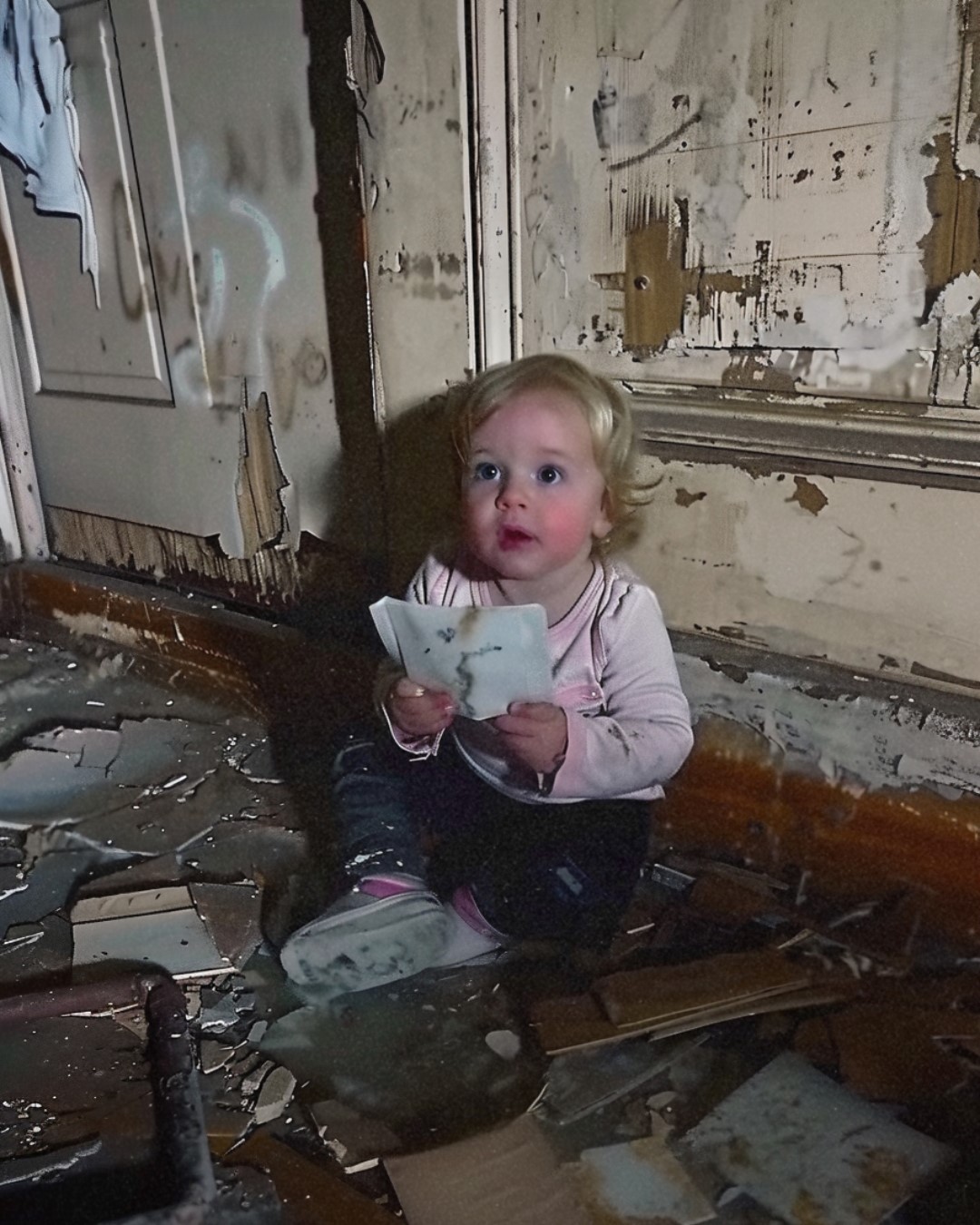It was an ordinary Saturday morning in our quiet suburban neighborhood when I noticed a moving truck pull up next door. The old house had been vacant for years, so seeing new activity piqued my curiosity. I watched from my window as a peculiar family stepped out.
The man was tall and brooding, with sharp features that gave him an air of mystery. His wife, however, stood out even more—pale, distant, and fragile-looking, as though she belonged to a different world altogether. But it was the little girl who truly captured my attention.
She couldn’t have been older than four, clutching a worn teddy bear and looking so small against the overgrown yard. Her big, innocent eyes seemed to carry a quiet sadness. She played alone, her tiny figure almost swallowed by the wild grass.
Something about her tugged at my heart.
A few days later, while on my morning walk, I noticed the little girl, Lily, playing dangerously close to the street.
“Hey there, sweetheart,” I called, hurrying over. “Let’s stay away from the road, okay?”
She looked up at me with wide eyes, clutching her teddy bear tightly. “I was just waiting,” she whispered.
“For who?” I asked.
She shrugged.
I held her tiny hand and walked her back toward her house. When I knocked on the door, no one answered. Hesitant, I pushed the door open slightly, calling out. The house was eerily quiet, sparsely furnished, and felt cold and empty.
“Do you live here alone?” I asked gently.
“No,” Lily replied. “But Mommy and Daddy are gone a lot.”
I didn’t know what to say. Instead, I decided to keep her company for a little while. We played outside, drawing shapes in the dirt with sticks and building small castles with stones. Her giggles lit up the air, and I felt a deep warmth inside me—a longing I hadn’t felt in years.
When the sun began to set, a woman appeared, walking toward us. It was Lily’s mother. Her pale face remained expressionless as she took Lily’s hand.
“Thanks,” she said flatly. “I was nearby.”
Nearby? I couldn’t believe it.
Before leaving, she turned back briefly. “You should come over for tea tomorrow.”
It wasn’t so much an invitation as an obligation. But I nodded, agreeing anyway.
I glanced down at Lily. She had been so engaged, so full of life while we played, but the moment her mother appeared, something in her seemed to change.
“Lily, it’s time to go.”
Without a word, Lily simply walked over to her mother, her small hand slipping into the woman’s cold grasp. There was no protest, no hesitation—just quiet obedience.
“Okay, Mommy.”
Lily looked back at me. “Will you come to play with me again?”
“Of course, sweetie,” I replied, my voice catching in my throat.
As I watched them disappear down the path, a sense of unease crept over me. That sadness in Lily’s eyes was like a silent plea, a cry for help that she couldn’t voice.
There was something off about this family—something I couldn’t quite put my finger on.
The next day, I hesitated, staring at the chipped paint on the neighbor’s door, then knocked. No answer. I knocked again, louder this time, but still nothing.
“Hello? It’s me, from next door,” I called out, hoping to hear some sign of life inside.
Nothing. The house remained eerily quiet, the silence pressing down on me like a weight. After what felt like an eternity, I hesitantly pushed the door open and stepped inside.
“Hello?”
My footsteps sounded loud against the wooden floor as I wandered through the rooms, each one emptier than the last.
Then, in the living room, I found Lily. She was sitting on the floor with a pack of cookies and a bottle of water. She was holding a piece of paper in her tiny hands.
“Lily?” I whispered, kneeling beside her.
She didn’t say anything, just handed me the note. I unfolded the paper, the heartbreaking message inside sending a cold chill down my spine:
“She’s yours if you want her. We know you’ll take good care of her.”
I stared at the words, my mind racing.
Who would do such a thing? Abandon their child like this, leaving her in an empty house with nothing but a note?
Panic started to rise in my chest, and I grabbed Lily, pulling her close.
“We need to go,” I whispered, scooping her up into my arms.
As I headed for the door, a terrifying thought crossed my mind.
What if this was a trap?
I froze for a moment, my heart pounding. But then I looked down at Lily. I couldn’t leave her there, no matter the risks.
When we arrived back at my house, Samuel was already home. He looked up from the couch as I walked in.
“What is this?” he demanded.
I set Lily down gently and handed her a box of crackers and a glass of milk.
“Here, sweetie, why don’t you have a snack and watch some cartoons?” I said, turning on the TV to distract her.
Once she was settled, I turned back to Samuel, who was now standing, his face twisted with anger.
“Why is there a child in our house, Eliza?” he raised his voice.
“Samuel, I found her alone,” I began, my voice trembling. “In that empty house, with nothing but this note.”
I handed him the paper. He read the note quickly, then looked up at me.
“You’ve broken our agreement, Eliza. We agreed—no children in this house!”
“Samuel, I couldn’t just leave her there! She was all alone, with no one to take care of her,” I pleaded, trying to make him understand.
But his anger only grew.
“I told you I didn’t want kids! And now you’ve brought one into our home? Do you even realize what you’ve done?”
His words cut deep, like a knife twisting in my chest.
“You never said that! All these years, you said it was because of your health…”
He looked away, his jaw clenched.
“I lied. I never wanted children, Eliza. I just didn’t want to lose you.”
It felt like the ground had been pulled out from under me. All those years, all those hopes and dreams… I had been living a lie.
Samuel delivered his ultimatum:
“Either you take her back, or go away.”
I stared at him, the man I had loved and trusted, and realized that I couldn’t stay. Not like this. Not with him.
Without another word, I turned away from him, gathering a few belongings. I packed a small bag, trying to hold back the tears that threatened to spill over.
I couldn’t abandon Lily after everything she had already been through.
As I took Lily’s hand and led her to the door, Samuel didn’t stop me. He just stood there, cold and distant, as if we were strangers.
I had no idea where we would go.
Finally, we ended up at the school where I work and spent the night in my office. I knew it wasn’t a permanent solution, but it was a start.
In the following days, I began the adoption process for Lily, but it wasn’t easy. The authorities insisted I needed a stable home.
Then, unexpectedly, they informed me that Lily’s biological parents had left her an inheritance—the house. So, I could adopt Lily and move in there.
Shocked, I dug deeper and discovered that Lily’s foster parents—my neighbors—had adopted Lily solely for that inheritance. But realizing they couldn’t care for her, they decided she deserved better.
To ensure she wouldn’t end up in another home for the wrong reasons, they left her, and the house, in my care. We moved in the same day, and the house became our home, filled with warmth and love.
Lily slowly opened up, and every time she called me “Mommy,” my heart swelled.
Samuel, living alone, began to reconsider his choices. He started helping around the house and taking care of Lily when I was busy. Forgiving him wasn’t easy, but his efforts made me feel that maybe we could find our way back to each other.

